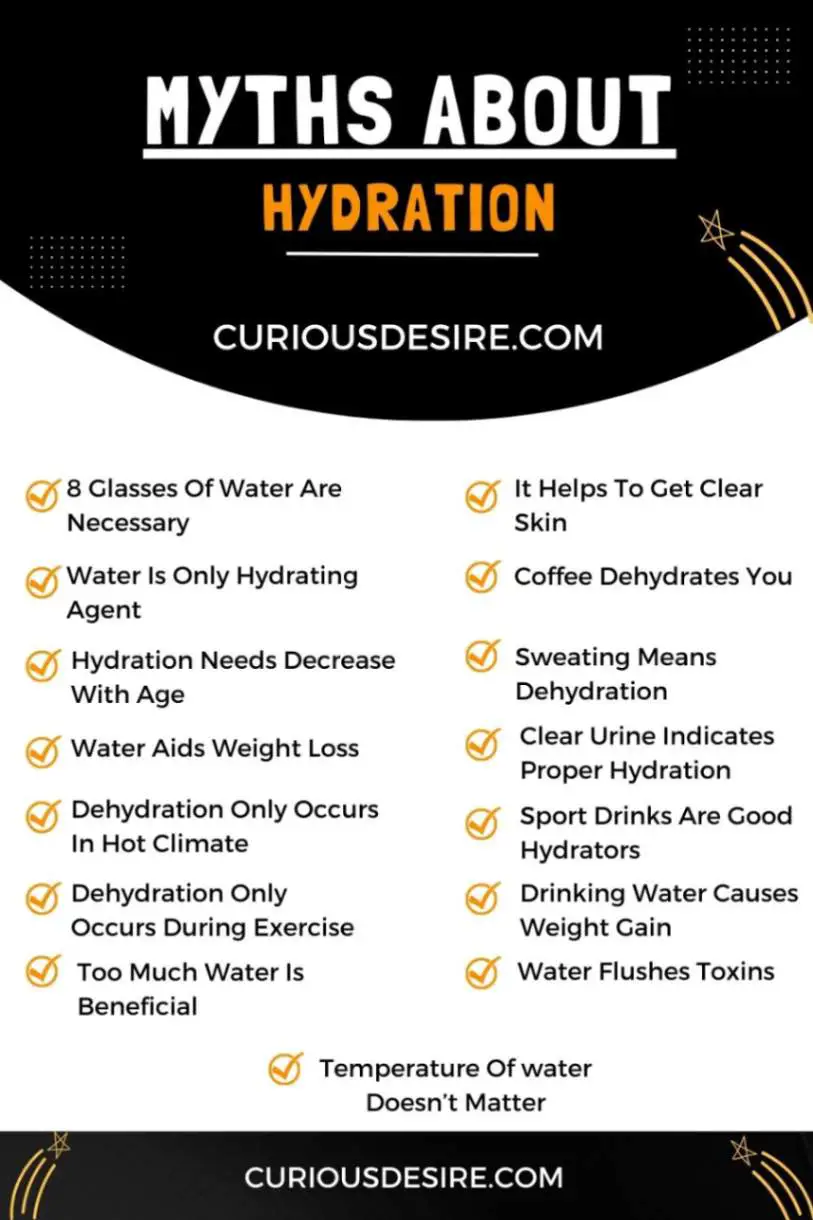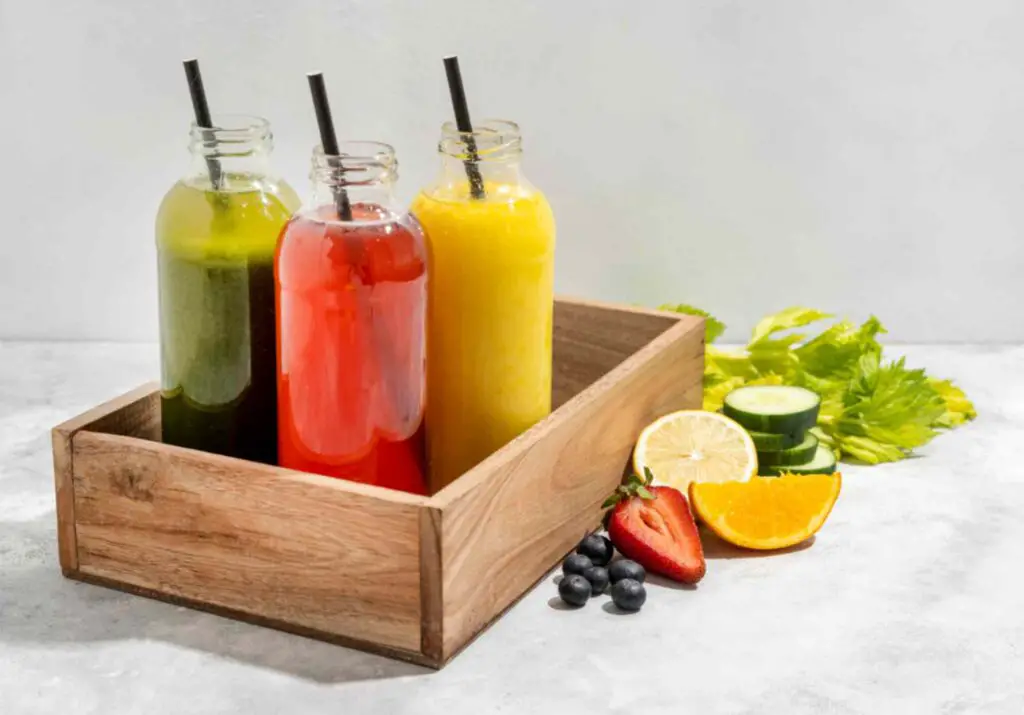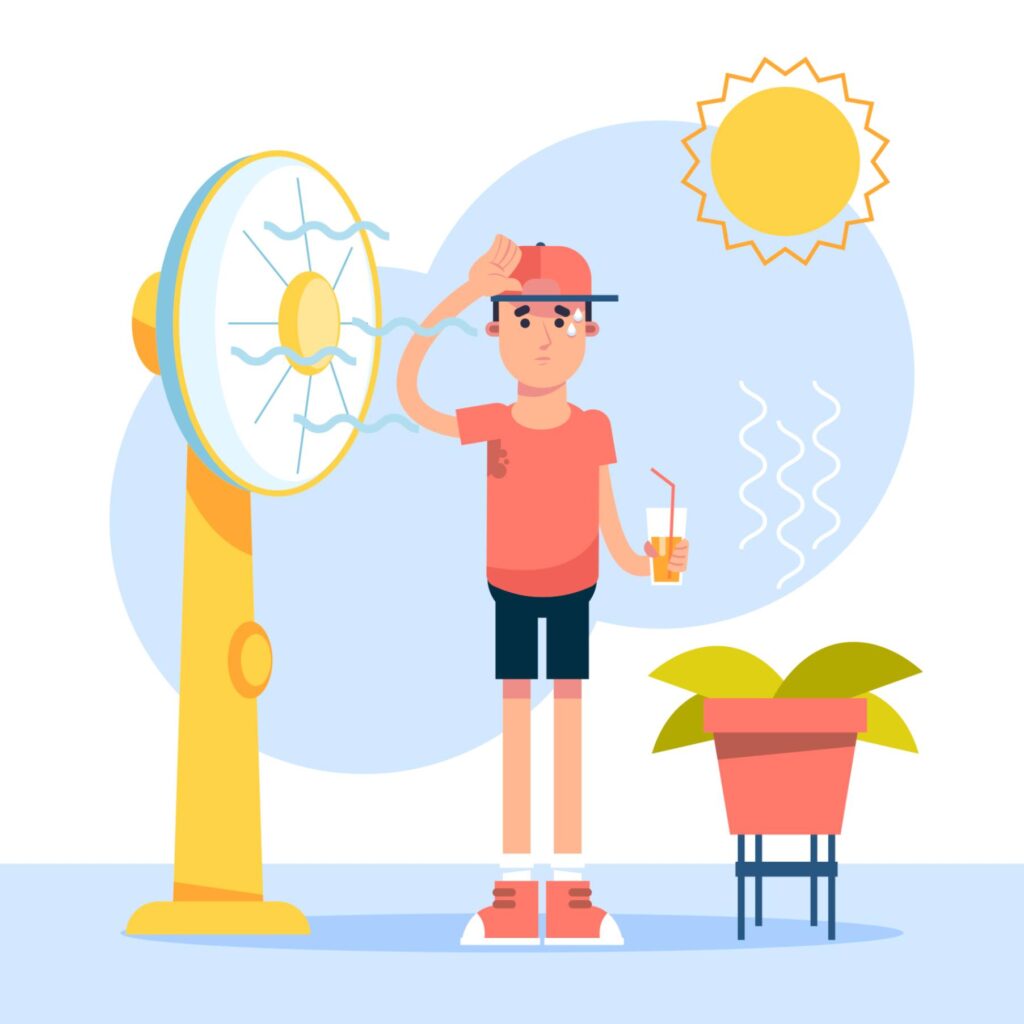Water is not the only drink that hydrates you. Did you know that studies showed that some other drinks might be more hydrating than water?
False ideas, overwhelming information, and myths about hydration have tainted our understanding of this topic. Let’s dive into the sea of information and get to the bottom of the myths surrounding hydration.
5 Most Common Myths About Hydration:
- It is necessary to gulp down at least 8 glasses of water a day
- Dark-colored urine indicates that you’re dehydrated
- Drinking water helps you to get rid of acne
- Coffee and tea are dehydrating agents
- Water is the only thing that hydrates you

Myth 1: 8 Glasses of Water in a Day Are Necessary to Quench Thirst
Why This Myth Exists:
The famous “eight glasses a day” rule has become ingrained in our minds, It is correct that 70% of the human body consists of water but this fact doesn’t account for excessive water drinking. Eight glasses a day isn’t the gold standard for hydration.
Debunking The Myth:
Here’s the clarification for one of the most popular myths about hydration The hydration needs of different people are different and it is influenced by factors such as
- age
- diet
- health
- activity level
A slim sedentary individual cannot be held to the same standard as a larger, more active person.
Moreover, environmental factors such as heat and humidity demand adjustments to fluid intake that the generic recommendation fails to address.
This myth narrowly focuses on the consumption of plain water, overlooking that hydration isn’t confined to this single source.
A significant portion of our daily fluid intake comes from the foods we consume, particularly fruits and vegetables with high water content
Typically, you should consume an amount of fluids equivalent to one-third of your body weight in ounces every day. For Instance, If your weight is 120 pounds, drink around 80 oz. of water a day.
Myth 2: Drinking Water Will Help You Get Clear Skin
Why This Myth Exists:
This is one of the most famous myths about hydration. Water undeniably plays a significant role in maintaining skin health. It helps keep our skin cells hydrated, regulates body temperature, and aids in nutrient transportation.
But before you start downing liters of water expecting a skincare miracle, let me clarify; staying hydrated is crucial, but it’s not the sole determinant of how your skin will look and feel.
Debunking The Myth:
Our skin’s well-being is influenced by a variety of factors, both internal and external. Genetics, diet, skincare routines, environmental conditions, and lifestyle choices all contribute to the complexion and texture of our skin.
Sorry to break your bubble but hydration won’t cure your acne either. Consult a healthcare professional for proper treatment.
Myth 3: Water Is the Only Thing That Hydrates You
Why This Myth Exists:
We keep hearing the timeless advice that water is the be-all and end-all from medical professionals when it comes to hydration. While there’s no denying the importance of water, the idea that it’s the only hydrator in our lives is a bit of an exaggeration.
Debunking The Myth:
This is one of the most prevalent myths about hydration. While often criticized for their sugar content, fruit juices, and smoothies can be hydrating and offer additional nutritional benefits.
They contain water, vitamins, and minerals that contribute to overall hydration and provide a flavorful alternative to plain water
A study published in an American journal revealed that milk, tea, and orange juice have a slightly higher hydrating effect, possibly because of the electrolytes sodium, calcium, potassium, chloride, phosphate, and magnesium.
Foods: Many foods, especially fruits and vegetables, have high water content. Watermelon, cucumber, oranges, and lettuce, for example, not only contribute to daily water intake but also offer vital vitamins and minerals.
Soups and broths, too, provide hydration while delivering a comforting and nourishing experience

Myth 4: Coffee and Tea Dehydrate You
Why This Myth Exists:
In reality, coffee is a hydrating beverage and can contribute to your daily fluid intake. While it is true that coffee has a mild diuretic effect, meaning that it can increase the production of urine, the overall impact on hydration is minimal. It contains caffeine which leads to the rise of this myth.
Furthermore, the idea that coffee dehydrates you might stem from a misunderstanding of the difference between diuretic effects and dehydration.
Debunking The Myth:
Although coffee’s caffeine may have a diuretic effect, it is unlikely to cause dehydration. Moderate consumption of coffee and tea can be part of your healthy and adequately hydrated lifestyle. This myth about hydration lacks a solid scientific foundation.
As with any beverage, it’s essential to enjoy coffee as part of a varied and balanced diet while also paying attention to your overall fluid intake to maintain proper hydration.
Life is too short to say no to coffee!
Myth 5: Hydration Needs Decrease With Age
Why This Myth Exists:
People believe that with age, the hydration demand of the body decreases as old are less involved in physical activities. This is entirely incorrect and baseless.
Debunking The Myth:
Certain physiological changes indeed occur with age, but these changes do not necessarily lead to decreased hydration needs. Maintaining adequate hydration is crucial for overall health, and older adults may face unique challenges that require careful consideration.
According to Doctor, Anne Vanderbilt “Drinking water is something you need to focus on more as you age”
Myth 6: Sweating Means You’re Dehydrated
Why This Myth Exists:
Sweating is a natural physiological response designed to cool the body, especially during extreme physical exercise, or exposure to warm environments
Sweat is primarily composed of water, sodium, chloride, and potassium. It has a hypotonic composition that allows for efficient evaporative cooling when sweat evaporates from the surface of the skin.
Debunking The Myth:
Sweating is the body’s way of cooling down, particularly in response to physical activity or exposure to heat. However, the volume and composition of sweat are not solely determined by hydration status. Sweating is influenced by a myriad of factors, including environmental conditions, individual differences, and the intensity and duration of physical exertion.
Understanding the science behind sweating, acknowledging that your body is unique, and recognizing its sophisticated ways of managing fluids are key to dispelling this myth about hydration.
Myth 7: Drinking Water Before Meals Helps in Weight Loss
Why This Myth Exists:
We’re living in times when people around us are obsessed with weight loss. They look for easy and sustainable ways to shed some pounds and in the process, they easily trust the misinformation.
Drinking a lot of water before a meal makes you partially full and you end up eating less. Well, it is not a sustainable way to lose weight.
Debunking The Myth:
Drinking water before meals does not directly contribute to burning more calories or increasing the body’s metabolic rate. While there is some evidence that drinking water can slightly elevate the resting metabolic rate, the effect is modest and temporary.
The overall impact on weight loss is minimal, and other factors, such as diet and physical activity, play more significant roles in managing body weight.
Sorry to break your bubble, but I have to set the record straight!
Myth 8: Clear Urine Always Indicates Proper Hydration
Why This Myth Exists:
It is one of the most common myths about hydration. Urine color can provide some insight into hydration levels, but it is not the sole determining factor, and clear urine does not always equate to optimal hydration.
Debunking The Myth:
Urine color can be influenced by various dietary components, certain medicines, and underlying health conditions. The use of medications like multivitamins or antibiotics may cause changes in urine color, giving it a more vibrant or unusual hue.
Here’s a little-known fact that clear urine may indicate an underlying health condition such as diabetes, and kidney stones. I bet you weren’t aware of this.
Myth 9: Dehydration Is Only a Concern in Hot Climates
Why This Myth Exists:
Dehydration is not exclusive to hot climates; it can also be a concern in cold environments. In colder temperatures, individuals may not feel as thirsty as they would in the heat, leading to decreased water intake.
Debunking The Myth:
The body’s natural signal for the need for fluids is thirst, which can occur in various environments. Ignoring thirst cues, regardless of the external temperature, can lead to dehydration.
Additionally, cold weather conditions, such as dry air or high-altitude environments, can increase respiratory water loss and contribute to dehydration.
Dehydration can also occur in indoor environments, irrespective of the external climate. Factors such as centrally heated or air-conditioned spaces can lead to reduced humidity levels, increasing the potential for dehydration. Additionally, activities like exercising in a gym or working in an office with low humidity levels may contribute to fluid loss and dehydration.

Myth 10: Sports Drinks Are Great for Everyday Hydration
Why This Myth Exists:
The myth that sports drinks are a suitable and reliable source for everyday hydration has been put up by marketing campaigns and misconceptions about their benefits.
Debunking The Myth:
While sports drinks are designed to reload electrolytes lost during intense physical activity, relying on them for everyday hydration can lead to various health issues and unnecessary calorie consumption.
Sports drinks are also more expensive than water. Go easy on your pockets, and drink water for hydration which provides the body with the essential fluid it needs without unnecessary additives, calories, or associated health risks. This also assists you in debunking baseless myths about hydration,
Myth 11: Dehydration Only Happens During Intense Physical Activity
Why This Myth Exists:
Since the body’s hydration needs increase during extraneous exercises, people think dehydration can only happen when we are in physically hard tasks. This has to be among the most ridiculous myths about hydration.
Debunking The Myth:
Dehydration is not confined to high-intensity workouts. Simple, routine activities like walking, standing for long periods, or exposure to hot and humid conditions can lead to fluid loss through sweating.
Various illnesses such as fever, vomiting, diarrhea, and certain medications can contribute to fluid loss and reduce the body’s ability to retain water.
Prioritize your water intake to support overall health and well-being.
Myth 12: Drinking Water Before Bed Causes Weight Gain
Why This Myth Exists:
Adequate hydration plays a crucial role in maintaining a healthy metabolism. When the body is well-hydrated, metabolic processes can function optimally, contributing to efficient calorie burning. Dehydration, on the other hand, can lead to a temporary slowing of metabolism and can cause a little weight gain as well.
Debunking The Myth:
The fact that water is a calorie-free fluid is enough to dispel this myth, isn’t it?
Drinking water before bed ensures that your body remains adequately hydrated, potentially supporting a more robust metabolism rather than causing weight gain.
Myth 13: Drinking Too Much Water Is Always Beneficial
Why This Myth Exists:
This myth stems from a well-intentioned emphasis on the importance of staying hydrated for overall health. While describing the importance of water intake we overlook the potential risks associated with excessive water intake.
Debunking The Myth:
It is correct that 70% of the human body consists of water but this fact doesn’t account for excessive water drinking Here are several key points that debunk the myth that drinking excessive amounts of water is always beneficial:
- Risk of Hyponatremia: Drinking an excessive amount of water can lead to a condition called hyponatremia, which occurs when the balance of sodium in your body is disrupted by an overwhelming intake of water. The kidneys become unable to excrete the excess water.
- Electrolyte Imbalance: Drinking too much water can disrupt the balance of electrolytes in the body. Electrolytes, such as sodium, potassium, and chloride, play crucial roles in maintaining proper hydration.
- Impact on the Cardiovascular System: Overhydration can also affect the cardiovascular system, leading to a condition known as water intoxication.
Source: Insider Science YT Channel
Myth 14: Water Flushes Toxins From Your Body
Why This Myth Exists:
Detoxification is a sophisticated, ongoing process orchestrated by various organs, with water serving as a facilitator. This gives rise to the myth. The role played by water is huge and necessary but it doesn’t directly flushes toxins.
Debunking The Myth:
and digestive systems work in harmony to break down and eliminate toxins. Water, while crucial for these processes, doesn’t directly flush toxins out of the body as commonly implied.
Water plays a crucial role, as it helps maintain the volume and composition of urine.
However, it is the liver and kidneys that perform the intricate task of transforming and eliminating toxins, not water alone.
Myth 15: Water Temperature Doesn’t Matter for Hydration
Why This Myth Exists:
The myth may arise from an assumption that the body absorbs water uniformly, regardless of its temperature.
Debunking The Myth:
While the body efficiently absorbs water, the rate of absorption can vary, and some people may overlook the potential benefits of consuming water at a more moderate temperature.
Hydration plays a fundamental role in maintaining body functions, supporting cognitive performance, regulating body temperature, and promoting skin health. Quench your thirst, and be your best!
Hydration Myths FAQs
1. Is drinking too much water harmful?
Drinking too much water results in a condition called hyponatremia. When excessive water intake dilutes sodium levels in the body, it can lead to nausea, headaches, confusion, and in severe cases, seizures or coma.
2. Can certain foods impact hydration levels?
Yes, certain foods can contribute to your hydration. Foods with high water content, such as fruits and vegetables like watermelon, cucumbers, and oranges, can help keep you hydrated.
3. Does clear urine mean I’m always well-hydrated?
Clear urine is generally a good sign, but it’s not the only indicator of hydration. Pay attention to your overall fluid intake and lifestyle factors.
4. Do certain medical conditions affect hydration needs?
Yes, certain medical conditions, such as diabetes and kidney disease, can impact hydration needs. If you’re suffering from these diseases you must work closely with your doctor to understand your limitations on fluid intake.
5. Do environmental factors impact hydration needs?
Yes, environmental factors such as altitude, humidity levels, and temperature can significantly impact your hydration needs. For example, at higher altitudes, the body may lose more water through increased respiration.
6. Is thirst the best indicator of hydration needs?
It is one of the most prevalent myths about hydration that thirst is the best indicator of hydration. While thirst is a reliable indicator of the need for fluids in most situations, it is not the best indicator. In some cases, you are not thirsty but your body needs more water for the proper functioning.
7. What is the fastest way to successfully treat dehydration?
Water is the most natural and effective choice for staying hydrated. Unlike sugary drinks, water quenches your thirst without adding unnecessary calories to your diet.
8. Can dehydration affect my cognitive function?
Yes, dehydration can impair cognitive function, leading to difficulties in concentration and memory. Staying hydrated is important for optimal brain function.